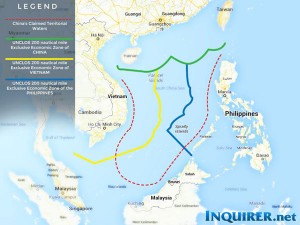US vents criticism of Chinese maritime claims

Sharpening US criticism of the rising Asian power, Daniel Russel, the top US diplomat for East Asia, described in congressional testimony a litany of actions by China that are raising tensions.
Russel said China has restricted access to a contested reef in the West Philippine Sea; taken bids on areas far from its own shores for hydrocarbon exploration; and imposed fishing regulations in disputed waters.
“There is a growing concern that this pattern of behavior in the South China Sea reflects an incremental effort by China to assert control over the area contained in the so-called ‘nine-dash line,’ despite the objections of its neighbors,” Russel said, referring to the map markings used by China to depict its maritime territorial claims.
“Any use of the ‘nine-dash line’ by China to claim maritime rights not based on claimed land features would be inconsistent with international law,” he said, urging China to clarify or adjust its claim.
Using less diplomatic language, Republican Representative Matt Salmon said China’s approach seemed to be, “we’re going to see what we can get away with, and if the US has the guts, the cojones, to challenge us.” Democratic Representative Gerry Connolly said from a distance it looks like China is “picking a fight with Vietnam, with the Philippines, with Japan, among others.”
China cites a historical basis for its West Philippine Sea claims. According to the US Congressional Research Service, the nine-dash line covers roughly 80 percent of those resource-rich waters, which are dotted with reefs and islands subject to multiple disputes, also involving the Philippines, Vietnam, Malaysia, Brunei and Taiwan.
The US says it takes no position on the competing sovereignty claims, but says it has a national interest in peaceful resolution of the disputes and in freedom of navigation and commerce. Russel said that agreement between China and Southeast Asia’s regional bloc on a code of conduct to regulate behavior in the West Philippine Sea is long overdue.
China has been reluctant to discuss territorial disputes with the bloc, although there has been tentative progress on negotiating the code in the past year.
Russel also voiced concern about the “serious downturn” in relations between China and Japan, a close US ally.
He criticized China’s “provocative” declaration of an air defense identification zone over the East China Sea and a spike in “risky activity” by China near uninhabited islands controlled by Japan but also claimed by China. He said the US supported Japan’s call for diplomacy and crisis management procedures to avoid a dangerous incident.
Japan’s foreign minister will meet with Secretary of State John Kerry in Washington on Friday.
Japan’s prime minister recently angered China and drew a rare US expression of disapproval for visiting a controversial war shrine in Tokyo.
Some Republicans took issue with the Obama administration at Wednesday’s hearing, saying its attempt to refocus US foreign policy toward Asia lacked substance and that it had failed to reassure allies there.
“The Asia-Pacific region is the future. It’s the driver of the global economy and will make our break our geopolitical role in the world,” said Steve Chabot, Republican chair of the House subcommittee overseeing US policy toward the region.
RELATED STORIES
Aquino: China’s rulers like Hitler
Sense of destiny drives China aggression, says US
China lashes out at US, Japan for ‘irresponsible remarks’ over ADIZ issue
For comprehensive coverage, in-depth analysis, visit our special page for West Philippine Sea updates. Stay informed with articles, videos, and expert opinions.
